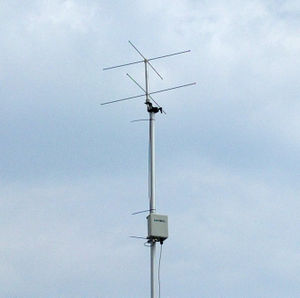Difference between revisions of "No rotator"
From SatNOGS Wiki
| Line 13: | Line 13: | ||
No-Rotator ground station it uses a static antenna usually in VHF. | No-Rotator ground station it uses a static antenna usually in VHF. | ||
A Turnstile antenna that tuned at ~137MHz is used for NOAA satellites. | A Turnstile antenna that tuned at ~137MHz is used for NOAA satellites. | ||
| − | Some Turnstile | + | Some Turnstile antenna designs, it's wide enough to receive VHF band at 144 - 146 MHz. |
| − | For more vertical passes, UHF Helical antennas receives satellites at 432 - 438 MHz, | + | For more vertical satellite passes, UHF Helical antennas receives satellites at 432 - 438 MHz, |
e.g. [https://network.satnogs.org/stations/8/] | e.g. [https://network.satnogs.org/stations/8/] | ||
| − | {{Message| Same setup could be used for rotator | + | {{Message| Same setup could be used for a ground station with rotator.}} |
= Bill of Materials = | = Bill of Materials = | ||
Revision as of 10:59, 23 June 2017
| No-Rotator | |
|---|---|
| Information | |
| Type: | No-Rotator ground station for SatNOGS network. |
| Cost: | |
| Release Information | |
| Status: | Working |
| Latest Release: | [ ] |
| Repository: | [] |
| Documentation: | [] |
No-Rotator ground station it uses a static antenna usually in VHF.
A Turnstile antenna that tuned at ~137MHz is used for NOAA satellites.
Some Turnstile antenna designs, it's wide enough to receive VHF band at 144 - 146 MHz.
For more vertical satellite passes, UHF Helical antennas receives satellites at 432 - 438 MHz,
e.g. [1]
Bill of Materials
The materials are categorized into 3 groups:
- RF components
- Client components
- Hardware components
| Part | Description | Qty | Source | Price |
